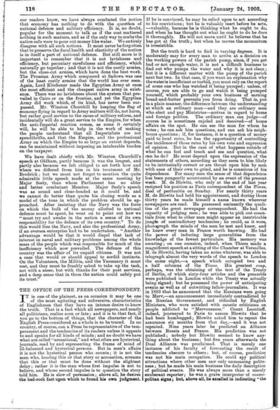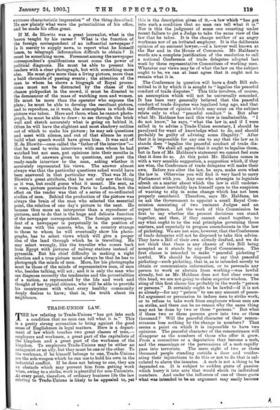THE OFFICE OF THE PRESS CORRESPONDENT.
IT is one of the plainest, as on occasion it may be one of the most agitating and subversive, characteristics of Englishmen that they have an intense desire to know the truth. That is a fact which all newspapers, and nearly all politicians, realise soon or late ; and it is to that fact, if you go to the bottom of things, that the character of the English Press considered as a whole is to be traced. In no country, of course, can a Press be representative of the tem- perament and the tendencies of its readers unless it appeals to and speaks for all kinds of minds ; and no doubt we have what are called "sensational," and what often are hysterical, journals, read by and representing the frame of mind of ill-balanced and hysterical persons. But in men's affairs it is not the hysterical person who counts ; it is not the man who, hearing this or that story or accusation, screams that this or that must be done without the slightest delay ; rather it is the man whose first impulse is not to believe, and whose second impulse is to question the story told him. He is slow of persuasion ; above all, he desires the bed-rock fact upon which to found his own judgment. If he is convinced, he may be relied upon to act according to his convictions; but he is valuably inert before he acts, —valuably, because he is thinking what he ought to do, and when he has thought out what he ought to do he does it thoroughly. He will not move until he believes that he has got at the truth ; but when he moves the momentum is irresistible.
But the truth is hard to find in varying degrees. It is moderately easy for every man to arrive at a decision on the working powers of the parish pump, since, if you get bad or not enough water, it is not a difficult business to find out who pumps the water and why it is not clean ; but it is a different matter with the pump of the parish next but two. In that case, if you want an explanation why the wateris insufficient or turbid, you must rely on the report of some one who has watched it being pumped ; unless, of course, you are able to go and watch it being pumped yourself, which probably your own business of earning bread-and-butter prevents you from doing. That is, put in a plain manner, the difference between the understanding at which an ordinary man—and they are ordinary men who elect and pay Ministries—arrives in regard to home and foreign politics. The ordinary man can judge—of course he is sometimes cajoled and deceived—of home affairs on the spot. He can see the man for whom he votes ; he can ask him questions, and can ask his neigh- bours questions ; if, for instance, it is a question of money paid to local rates, he has the opportunity of controlling the incidence of those rates by his own vote and expression of opinion. But in the case of what happens outside of what he can feel and touch and see and question, what (mn he do ? He must depend upon the expression of the statements of others, according as they seem to him likely to be intrinsically correct or are thrust upon him by men with axes of their own to grind, and he is conscious of his dependence. For many men the sense of that dependence has been pungently accentuated by an event of the present week. M. de Blowitz, who only at the end of last year resigned his position as Paris correspondent of the Times, died of peritonitis on Sunday. For nearly thirty years M. de Blowitz had held his appointment, and during those thirty years he made himself a name known wherever newspapers are read. He possessed eminently the quali- ties of the great newspaper correspondent. He had the capacity of judging men; he was able to pick out essen- tials from what to other men might appear an inextricable jungle of contradictory tendencies ; he could, as it were, photograph the minds of the men he met and knew, and he knew every man in France worth knowing. He had the power of inducing large generalities from the knowledge of the fewest particulars. His memory was amazing ; on one occasion, indeed, when Thiers made a magnificent speech at a sitting of the Chamber at Versailles, M. de Blowitz, having taken no notes whatever, was able to telegraph almost the very words of the speech to London the same night,—a speech which occupied two and a half columns of the Times. His greatest coup, perhaps, was the obtaining of the text of the Treaty of Berlin, of which sixty-four articles and the preamble were published in London while the Treaty was actually being signed ; but he possessed the power of anticipating events as well as of outwitting fellow-journalists. It was in 1883 that he announced that the Russians were going to Merv,—an announcement immediately contradicted by the Russian Government, and ridiculed by English Ministers, who were satisfied with caustic criticisms on people addicted to " Mervousness." Count Leontieff, indeed, journeyed to Paris to assure Blowitz that he had been humbugged; Blowitz asked him to repeat the assurance six months from that day,—and it was not repeated. Nine years later he predicted an Alliance between Russia and France. His prediction was not published ; nobody but Blowitz seemed to know any- thing about the business ; but five years afterwards the Dual Alliance was proclaimed. That is merely one instance of his faculty of forecasting the result of tendencies obscure to others ; but, of course, prediction was not his main occupation. He could spy political attractions where other men saw only unmeaning polite- ness ; but he made his main business the daily description of political events. He was always more than a merely exuberant reporter ; he was a grave interpreter of cosmo- politan signs; but, above all, he excelled in indicating "the extreme characteristic impression " of the thing described. He saw plainly what were the potentialities of his office, and he made his office great.
If M. de Blowitz was a great journalist, what is the lesson taught by his career ? What is the function of the foreign correspondent of an influential newspaper ? Is it merely to supply news, to report what he himself hears, to telegraph information difficult to obtain ? It must be something more. Foremost among the newspaper correspondent's qualifications must come the power of political diagnosis. He must bd able to present his readers with a clear photograph, but with something more also. He must give more than a living picture, more than a bald chronicle of passing events ; the attention of the man to whom he shows a biograph of Royal proces- sions must not be distracted by the chase of the chance pickpocket in the crowd, it must be directed to the demeanour of the mass of watching men and women. He must be more than the operator who exposes the plate ; he must be able to develop the resultant picture, and to reproduce, as it were, the atmosphere in which the picture was taken. Here and there, when he cannot photo- graph, he must be able to draw : to see through the brick wall and sketch accurately what is going on behind it. Often he will have the slightest and most shadowy outline out of which to make his picture ; he may ask questions and meet with silence, and out of that silence he must build what speech would have given him. It was said of M. de Blowitz—once called the "father of the interview"— that he used to write interviews with men whom he had watched but not seen, put opinions into their mouths in the form of answers given to questions, and post the ready-made interview to the man, asking whether it accurately represented his views. The answer almost always was that the particular questions asked would have been answered in that particular way. That was M. de Blowitz's great attribute, that he not only saw the thing as it was, but could guess what it meant. He sent, as it were, picture postcards from Paris to London, but the effect on the reader was that of a series of co-ordinated studies of men. Behind the production of the picture was always the brain of the man who selected the essential point, the relation of one day's picture to the next. He became thus more an interpreter than a reproducer of pictures, and to do that is the huge and delicate function of the newspaper correspondent. The foreign correspon- dent of a newspaper is perpetually in the position of the man with the camera who, in a country strange to those to whom he will eventually show his photo- graphs, has to select views which will give a proper idea of the land through which he is travelling. He may select wrongly, like the traveller who comes back from Egypt with pictures of railway stations instead of pyramids. But his chief difficulty in making a right selection and a true picture must always be that he has to photograph the minds of men. More, for his photographs must be those of the minds of representative men, of men who, besides talking, will act ; and it is only the man who can diagnose correctly the tendencies and the potentialities of a nation, as represented by the life and work and thought of her typical citizens, who will be able to provide his countrymen with what every healthy community deeply desires to have ; that is, the truth about its neighbours.







































 Previous page
Previous page